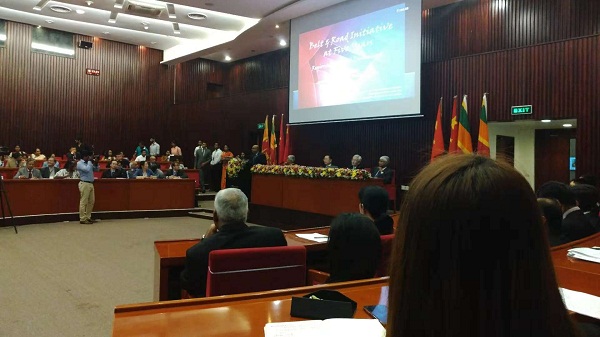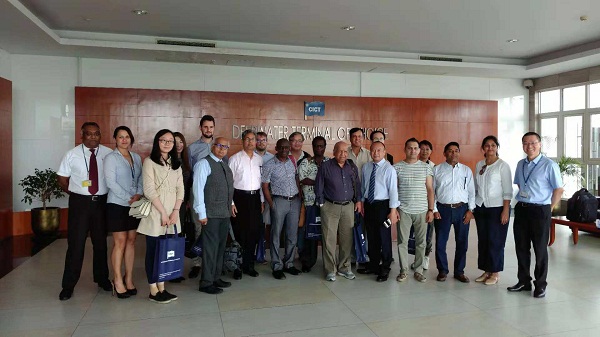Colombo (People’s Daily) – The Chinese Embassy in Sri Lanka hosted an international seminar, with the theme “The Belt and Road initiative (BRI) at Five Years – Regional and Global” on November 16.

Ambassador Cheng gives speech at the seminar (Photos: Yuan Jirong/People's Daily)
Twenty-one leading scholars from 10 countries, including China, Sri Lanka, Pakistan, India, Bangladesh, Nepal, Singapore, Spain, Greece and Kenya, participated in the seminar.
Around 350 representatives from various sectors of Sri Lanka and foreign diplomatic delegates attended the event.
Ambassador Cheng Xueyuan attended the opening ceremony and delivered a speech, in which Cheng stressed that the BRI has offered the world a solution to promote the development of the world economy and the reform of the global governance. Over the past five years, the BRI has developed from an initiative to a reality, from a vision to an important platform, and become more and more popular around the world. In the last five years, in-depth exchanges and cooperation in various fields has blossomed under the BRI framework. The pragmatic cooperation between China and Sri Lanka has made a great contribution to the Sri Lanka’s economic and social development, bringing tangible benefits to the two countries and two peoples.
Cheng emphasized that the BRI consists connectivity in five major areas, among which “policy connectivity“ is the initial and “peoples’ connectivity“ is the building blocks. As a new initiative, it needs to keep exploring while dealing with the challenges, and keep innovating. He encouraged all scholars and delegates to make full use of the seminar, to have an in-depth discussion, to contribute more wisdom and inject new impetus to this great initiative. The ambassador also sincerely called on all Sri Lankan friends to join hands with China, concentrate in promoting the bilateral pragmatic cooperation under BRI framework and jointly build a beautiful future for the two countries and peoples.
Dr. Rong Ying, vice president of the China Institute of International Studies, delivered a keynote speech, going through the last five years of the BRI and highlighting the future plan and emphasis of the initiative, the floor was given to all the scholars to discuss the initiative from national, regional and global perspectives. Professor Amal Jayawardena, senior professor of the Sir John Kotelawala Defense University, and Ambassador Bernard Goonetilleke, former foreign secretary and chairman of the Pathfinder Foundation, chaired the panel discussions.

Delegates visit Colombo Port City
Subhashini Abeysinghe, research director of the Verité Research in Sri Lanka, refuted the so-called "China‘s debt trap" with robust evidence and figures, while Shalika Dias, researcher and lecturer of BCIS, analyzed the challenges and opportunities of BRI to Sri Lanka. Muhammad Asif Noor, director of the Institute of Peace and Diplomatic Studies in Islamabad, and Yasir Masood, deputy director of the Centre of Excellence- China-Pakistan Economic Corridor (CPEC) Pakistan Institute of Development Economics, spoke about the CPEC and BRI’s prospects and challenges for Pakistan.
Professor Swaran Singh, Jawaharlal Nehru University, New Delhi, stressed that South Asia has all been involved in the BRI while its modalities also need to be adjusted accordingly for this region. Indian politician and columnist Sudheendra Kulkarni urged the Indian government to change the mindset and actively participate in the BRI.
Besides, Dr. Chan Hing Lee Henry, senior visiting research fellow, Cambodia Institute for Cooperation and Peace, Dr. George Tzogopoulos, senior research fellow, Centre international de Formation Européenne in France (International Center for European Training in France) and Professor Macharia Munene, United States International University in Kenya, shared their insights on BRI from ASEAN, European and African perspectives, respectively.
On the sidelines of the seminar, foreign scholars also visited the mega-projects under the framework of the BRI, which was jointly built by China and Sri Lanka, including the Colombo Port City, the Colombo International Container Terminal and the Hambantota Port.


